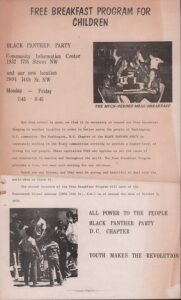Feeding the Future: How Community Agriculture Mirrors the Black Panther Party’s Free Breakfast Program
In the late 1960s, food insecurity plagued thousands of Black and low-income children across America. Many arrived at school hungry, making it nearly impossible to focus, learn, and thrive. Recognizing the crisis, the Black Panther Party (BPP) took action in 1969, launching the Free Breakfast for Children Program. This community-driven initiative provided nutritious meals while exposing systemic inequalities in food access.
Today, the spirit of this movement lives on in urban agriculture, community gardens, and farmers markets, which continue to address food injustice by ensuring fresh, healthy food reaches those who need it most.
A Revolutionary Response to Food Insecurity
The Free Breakfast for Children Program began in Oakland, California, fueled by a simple yet powerful mission: No child should go to school hungry. Volunteers—young activists, parents, and community members—woke up before dawn to prepare and serve hot, nutritious meals in churches, community centers, and Panther offices.
Word spread quickly, and within months, the program expanded to major cities like Chicago, New York, and Los Angeles. By 1971, over 20,000 children were receiving daily breakfast, proving that local action could combat hunger without waiting for government intervention.
Farmers, urban growers, and food activists today continue this work, ensuring that fresh food isn’t just a privilege but a right for all communities.
Food as a Political Statement
The success of the Black Panther’s food program embarrassed government officials, exposing the federal neglect of food-insecure communities. As a result, the U.S. government expanded food assistance programs, including strengthening the National School Breakfast Program, which is now a permanent fixture in public schools.
The impact extended beyond food, reshaping public perception of the Black Panther Party. While mainstream media often labeled the Panthers as radicals, the Free Breakfast Program revealed their deep commitment to serving, uplifting, and empowering communities.
A Legacy That Inspires Community Agriculture
The Black Panther Party’s work set the foundation for food justice movements today. Their grassroots approach mirrors what community farms, urban gardens, and farmers’ markets now strive to achieve:
🌱 Food Sovereignty – Empowering communities to grow their fresh produce.
🥦 Farmers Markets & CSA Programs – Connecting small farmers directly with local families.
🍎 School & Youth Gardening – Teaching children about nutrition and sustainable farming.
🌍 Policy Advocacy – Pushing for food equity in underserved communities.
Keeping the Movement Alive Through Agriculture
The Black Panthers believed in self-sufficiency and community empowerment, values that drive today’s urban farming and regenerative agriculture movements. While the Free Breakfast for Children Program fed thousands, today’s community gardens and farm initiatives carry on their legacy by providing access to healthy, homegrown food.
We support local farms, advocate for food justice, and grow food in urban spaces to continue the Black Panther Party’s mission of ensuring that no one, especially children, goes hungry. Food is power, and we take responsibility for cultivating change.
Reference
Black Panther Party’s Free Breakfast Program (1969-1980)

